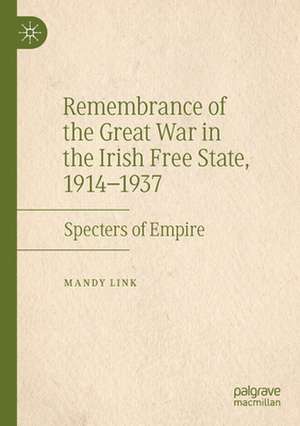Remembrance of the Great War in the Irish Free State, 1914–1937: Specters of Empire
Autor Mandy Linken Limba Engleză Paperback – 14 aug 2020
| Toate formatele și edițiile | Preț | Express |
|---|---|---|
| Paperback (1) | 522.42 lei 6-8 săpt. | |
| Springer International Publishing – 14 aug 2020 | 522.42 lei 6-8 săpt. | |
| Hardback (1) | 527.66 lei 6-8 săpt. | |
| Springer International Publishing – 27 iun 2019 | 527.66 lei 6-8 săpt. |
Preț: 522.42 lei
Preț vechi: 614.61 lei
-15% Nou
Puncte Express: 784
Preț estimativ în valută:
99.96€ • 104.65$ • 82.71£
99.96€ • 104.65$ • 82.71£
Carte tipărită la comandă
Livrare economică 05-19 aprilie
Preluare comenzi: 021 569.72.76
Specificații
ISBN-13: 9783030195137
ISBN-10: 3030195139
Pagini: 217
Ilustrații: VII, 217 p.
Dimensiuni: 148 x 210 x 16 mm
Greutate: 0.28 kg
Ediția:1st ed. 2019
Editura: Springer International Publishing
Colecția Palgrave Macmillan
Locul publicării:Cham, Switzerland
ISBN-10: 3030195139
Pagini: 217
Ilustrații: VII, 217 p.
Dimensiuni: 148 x 210 x 16 mm
Greutate: 0.28 kg
Ediția:1st ed. 2019
Editura: Springer International Publishing
Colecția Palgrave Macmillan
Locul publicării:Cham, Switzerland
Cuprins
1 Introduction.- 2 ‘The Flooding Sorrow’: The Great War, 1914-1918.- 3 No Man’s Land Endures: The Anglo-Irish War, 1919-1921.- 4 ‘Suffering does not stop when the shooting does’: The Irish Civil War, 1922-1923.- 5 ‘The emblem of sleep for the dead – and “dope” for the living’: Armistice Day, the Flanders Poppy and the National War Memorial, 1924-1932.- 6 Conclusion: Peace in the Free State? 1932-1937.-
Recenzii
“The author succeeds in her aim of providing an in-depth study of the interrelationship between Great War remembrance in Ireland and the larger political actions that shaped it. … Link’s writing is clear and succinct and … serve as an accessible point of research for scholars and students alike. This book serves as a large stepping stone in the discussions that have emerged about Ireland and its relationship with the conflict of 1914–1918.” (Meaghan Landrigan-Buttle, Canadian Journal of Irish Studies, Vol. 43, 2021)
“Link has produced a useful volume that both examines and raises important questions about an extremely complex aspect of Irish culture and identity. She makes good use of contemporary newspaper sources and is careful to highlight the editorial perspective of key publications. Her use of Bureau of Military History accounts adds some very useful material covering the Anglo-Irish and Irish Civil Wars. … advanced undergraduates, graduate students, and active scholarsalike will find it accessible and useful.” (Jason Myers, H-Net Reviews Humanities and Social Sciences, March, 2020)
“Link has produced a useful volume that both examines and raises important questions about an extremely complex aspect of Irish culture and identity. She makes good use of contemporary newspaper sources and is careful to highlight the editorial perspective of key publications. Her use of Bureau of Military History accounts adds some very useful material covering the Anglo-Irish and Irish Civil Wars. … advanced undergraduates, graduate students, and active scholarsalike will find it accessible and useful.” (Jason Myers, H-Net Reviews Humanities and Social Sciences, March, 2020)
Notă biografică
Mandy Link is Assistant Professor of Modern European History at the University of Texas at Tyler, USA.
Textul de pe ultima copertă
This book focuses on how Irish remembrance of the First World War impacted the emerging Irish identity in the postcolonial Irish Free State. While all combatants of the “war to end all wars” commemorated the war, Irish memorial efforts were fraught with debate over Irish identity and politics that frequently resulted in violence against commemorators and World War I veterans. The book examines the Flanders poppy, the Victory and Armistice Day parades, the National War Memorial, church memorials, and private remembrances. Highlighting the links between war, memory, empire and decolonization, it ultimately argues that the Great War, its commemorations, and veterans retained political potency between 1914 and 1937 and were a powerful part of early Free State life.
Caracteristici
Highlights the connections between war, memory, empire and decolonization in early Free State Ireland Explores the private acts of remembrance of Irishmen who served in the British Army during the First World War against the changing political landscape of revolutionary and independent Ireland Argues that the Great War was a far more integral and powerful part of Irish national identity in the early twentieth century than has previously been asserted
